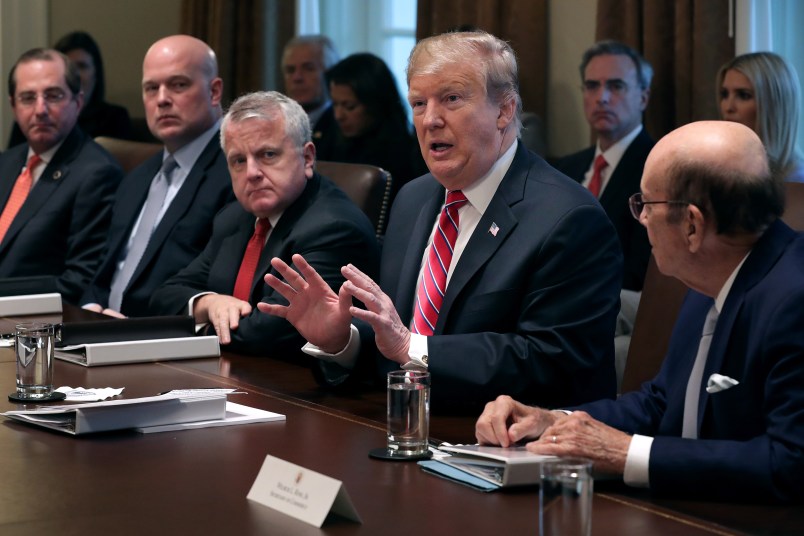President Trump may not be so hot on the tentative border funding deal to avoid another government shutdown, but many of his top Senate allies seem ready to embrace it.
Almost no Senate Republicans came out firing against the bipartisan agreement that negotiators reached in principle on Monday night. And while many said the devil will be in the details of the agreement, which is still being hammered out, some of Trump’s closest Senate associates publicly argued that it was as good as they were going to get.
“Right now it looks like the best deal that we could get. I congratulate the negotiators on getting it,” Sen. Kevin Cramer (R-ND) told reporters.
Cramer was one of the first congressmen to back Trump’s 2016 presidential bid, and Trump campaigned hard for his Senate race last year.
He said that if everything that GOP negotiators told him was in the bill — $1.375 billion for new physical barriers on the border and no hard cap on the number of detention beds for the Immigration and Customs Enforcement agency — he “would likely be a yes” vote on the deal. And Cramer warned that Congress is “fatigued” by the shutdown politics.
Sen. David Perdue (R-GA), a close Trump ally and border hawk who has worked with the White House on legislation that would dramatically reshape immigration law, also sounded hopeful about the proposed agreement.
“What I think we have is hopefully both sides have come some middle ground here that we can live with,” Perdue told TPM before the Senate lunches, after saying he hadn’t seen the exact deal language.
Sen. Joni Ernst (R-IA), who was on Trump’s shortlist for vice president, praised the deal as well, saying Republicans were “well on our way” to achieving Trump’s goals with the agreement.
Sen. Lindsey Graham (R-SC) said that he was waiting to confirm the details of the deal his colleagues had outlined during the luncheon — that President Trump would have the flexibility to reprogram money to fund more detentions beds beyond roughly 40,000 beds the deal allocates, and that the $1.375 billion for barriers can be used for the steel barriers that Trump has proposed.
“Once I get the answers to these two questions … if the answer is yes, I think it’d be acceptable,” he said.
Trump said Tuesday he was “not happy” with the deal’s broad outlines.
“I can’t say I’m happy. I can’t say I’m thrilled,” he said at the White House.
Graham predicted Trump would make an emergency declaration as well to try to seize more money for wall funding — a move that’s of questionable legality and is likely to be tied up in the courts.
“I never expected to get a whole lot more wall money, barrier money, so he’ll go the emergency route here pretty soon,” Graham said
Those allies were joined by more establishment-leaning Republicans who practically begged Trump to take the deal.
“I hope he signs the bill,” Senate Majority Leader Mitch McConnell (R-KY) told reporters. “I think he’s got a pretty good deal here.”
Sen. Roy Blunt (R-MO), one of the Republicans negotiating the deal, said there’d been little to no outright opposition expressed at the GOP Senate conference lunch.
“I really want him to sign this bill. I think its a good solution and a good down payment on further construction and other things,” Sen. Shelley Moore Capito (R-WV), who helped craft the agreement, told reporters.






